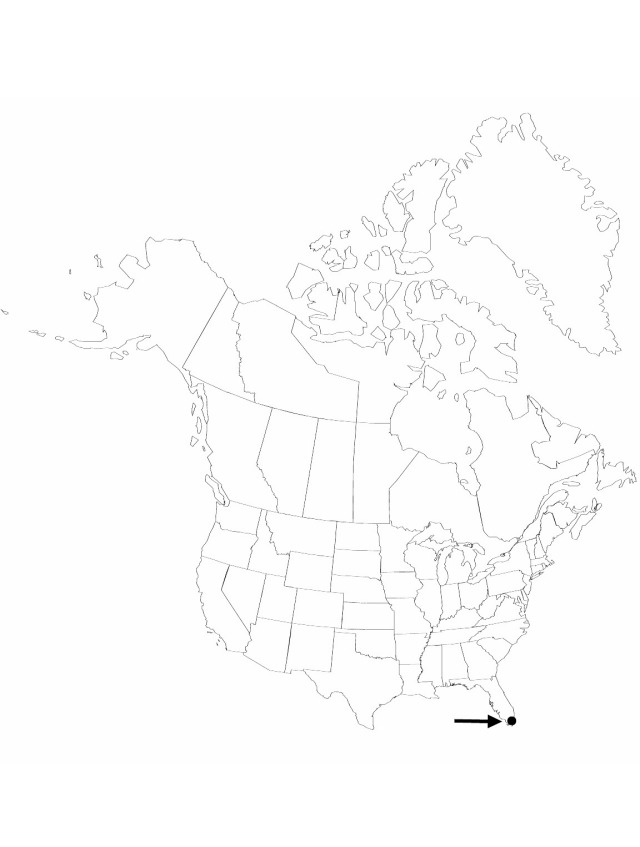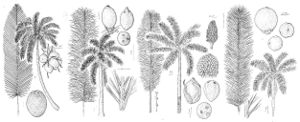Difference between revisions of "Syagrus romanzoffiana"
Fieldiana: Botany 31: 382. 1968.
FNA>Volume Importer |
imported>Volume Importer |
||
| (One intermediate revision by the same user not shown) | |||
| Line 8: | Line 8: | ||
}} | }} | ||
|common_names=Queen palm | |common_names=Queen palm | ||
| + | |special_status={{Treatment/ID/Special_status | ||
| + | |code=I | ||
| + | |label=Introduced | ||
| + | }}{{Treatment/ID/Special_status | ||
| + | |code=F | ||
| + | |label=Illustrated | ||
| + | }} | ||
|basionyms={{Treatment/ID/Basionym | |basionyms={{Treatment/ID/Basionym | ||
|name=Cocos romanzoffiana | |name=Cocos romanzoffiana | ||
| Line 38: | Line 45: | ||
|elevation=ca. 0–30 m | |elevation=ca. 0–30 m | ||
|distribution=Fla.;Fla.;native;South America. | |distribution=Fla.;Fla.;native;South America. | ||
| + | |introduced=true | ||
|discussion=<p><i>Syagrus</i> is tenuously represented in the flora by the cultivated ornamental <i>S. romanzoffiana</i>, still known in the nursery trade as <i>Cocos</i> plumosa. This South American species is widely planted throughout much of southern and central Florida. Although it is not yet widely established in the flora, seedlings volunteer in natural areas, and mature plants persist after cultivation. A closely related ornamental palm from South America, Butia capitata (Martius) Beccari, jelly palm, is widely grown in the southeastern United States and crosses with <i>Syagrus romanzoffiana</i>, producing × Butyagrus nabonnandii (A. R. Proschowsky) Vorster, largely sterile hybrids. Butia shows little inclination for escaping.</p> | |discussion=<p><i>Syagrus</i> is tenuously represented in the flora by the cultivated ornamental <i>S. romanzoffiana</i>, still known in the nursery trade as <i>Cocos</i> plumosa. This South American species is widely planted throughout much of southern and central Florida. Although it is not yet widely established in the flora, seedlings volunteer in natural areas, and mature plants persist after cultivation. A closely related ornamental palm from South America, Butia capitata (Martius) Beccari, jelly palm, is widely grown in the southeastern United States and crosses with <i>Syagrus romanzoffiana</i>, producing × Butyagrus nabonnandii (A. R. Proschowsky) Vorster, largely sterile hybrids. Butia shows little inclination for escaping.</p> | ||
|tables= | |tables= | ||
| Line 61: | Line 69: | ||
|publication title=Fieldiana: Botany | |publication title=Fieldiana: Botany | ||
|publication year=1968 | |publication year=1968 | ||
| − | |special status= | + | |special status=Introduced;Illustrated |
| − | |source xml=https:// | + | |source xml=https://bitbucket.org/aafc-mbb/fna-data-curation/src/2e0870ddd59836b60bcf96646a41e87ea5a5943a/coarse_grained_fna_xml/V22/V22_74.xml |
|subfamily=Arecaceae subfam. Arecoideae | |subfamily=Arecaceae subfam. Arecoideae | ||
|tribe=Arecaceae tribe Cocoeae | |tribe=Arecaceae tribe Cocoeae | ||
Latest revision as of 20:32, 5 November 2020
Stems solitary, smooth, with conspicuous nodal rings. Leaves ca. 5 m. Fruits 3.0–3.5 cm, ovoid, yellowish orange; endocarp ovoid, brown, with 3 germination pores. 2n = 32.
Phenology: Flowering throughout the year.
Habitat: Disturbed hammocks and woodlands
Elevation: ca. 0–30 m
Distribution

Introduced; Fla., Fla., native, South America.
Discussion
Syagrus is tenuously represented in the flora by the cultivated ornamental S. romanzoffiana, still known in the nursery trade as Cocos plumosa. This South American species is widely planted throughout much of southern and central Florida. Although it is not yet widely established in the flora, seedlings volunteer in natural areas, and mature plants persist after cultivation. A closely related ornamental palm from South America, Butia capitata (Martius) Beccari, jelly palm, is widely grown in the southeastern United States and crosses with Syagrus romanzoffiana, producing × Butyagrus nabonnandii (A. R. Proschowsky) Vorster, largely sterile hybrids. Butia shows little inclination for escaping.
Selected References
None.
